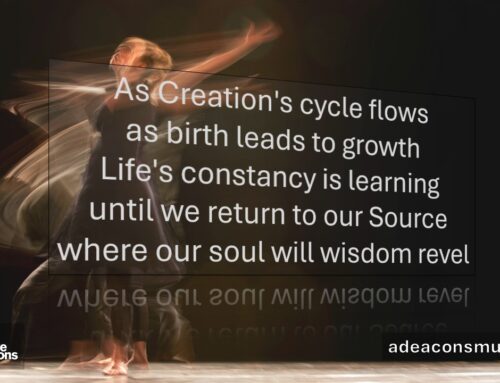Yes, I do admit that I’m wondering which ‘F-word’ has drawn you to this week’s A Deacon’s Musing … but that’s likely another blog, for another day. The ‘F-word’ I’d like to discuss is … feminism!
Let me set the scene as to why we’re discussing feminism. As many may or may not know, I’ve gone back to school. Recently, during one of my Doctoral Seminars, we were wrestling with the article, “’A World Split Open’?: Experience and Feminist Theologies,” by Kristine A. Culp. And – though there was much richness to the conversation – what strikes me, as I recollect, is that some people had a physically visible reaction to the word ‘feminism.’ The discussion, at times, veered away from the content of the article to how people felt about the movement in general and, in some cases, the desire to explore the option of using a different word. Even in the Learning Circle itself, I knew I was going to have to do some reflecting …
One of the things that I feel I need to make clear is that I do not presume to call myself a ‘feminist.’ I see the world through a lens of Liberation Theology. In essence, Liberation Theology analyses the world through an Oppressor-Oppressed framework: those who Have benefit at the expense of the Have-nots and often the use of force ensures that it is difficult to make changes. Feminism, in some areas, is often influenced by Liberation Theology and vice-versa. As one who clearly identifies with its intent, I endeavour to walk in solidarity with my feminist sisters!
As I attempt to walk and support the changes that feminism advocates, I’ve been trying to understand what I experienced in that Seminar. And, what I think was/is happening is the same thing whenever there is a prophetic challenge. The Prophetic Tradition, throughout our journey as a faith community, has often pissed people off, made them uncomfortable, forced us to look in the mirror and speaks truth without apology.
I have previously blogged about Knowing a Prophet, but what’s new for me is the necessity to recognise our reaction when the prophetic makes us uncomfortable! I believe that the word itself – feminism – continues to make people feel awkward. At its core, feminism is still relevant. One does not need to look outside of our Canadian context to ask why … just start looking around and it’s clear the hoped for equality, which is part of the feminist challenge, remains a goal that still requires commitment. If you’re needing more than a few words from me in a blog, here’s some homework to explore once you closed this window:
Those are just a few questions, but let me partially answer the last one for you: it is not uncommon for Christian faith-communities to close the leadership door to women. And – though the United Church of Canada has done some significant work in moving toward an egalitarian model of community – don’t be tempted to dismiss this as a gauge of what that means from a feminist critique. If Christians do not recognise that women – who make up over 50% of the human population – should have access to leadership, it seems we may very well have to both reflect and consider how we take action …
Blogs are often too short to fully explore a topic, to address all of the nuances, but let me leave you with this further connexion. The prophetic voice – in the Hebrew Scriptures – irritated people because it forced them to look at the status of women and children. If that status was life-devouring and soul-destroying, the prophets were VERY clear about what that meant for our relationship with God: it meant we were not living up to our Covenant and that, eventually, our poor choices would harm everyone, including – perhaps especially – those who were benefitting from short-sighted greed.
Feminist critiques, I believe, point us back to a time in our own Christian history, when we tried to respond to that voice: the Early Church. Before we became compromised as the religion of the Roman Empire, men and women held equal roles of leadership and walked with one another as Disciples sharing the Good News. I am not idealising the past or avoiding that it was not difficult to live in a manner contrary to the world around them. What I am saying, however, is that the prophets of the Hebrew Scriptures consistently advocated for women and children and we have a lived experience as how we might seek the balance that feminist voices continue to force us to hear … and we need to ask whether, even if uncomfortable, we are listening!








Your reflections are most welcome!